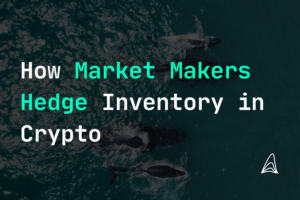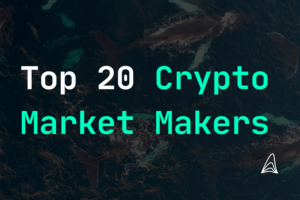
How the Gaming Blockchain Revolutionizes Play
- Jakob Brezigar
- Last updated: 12.February 2024
- Reading time: 9 min
Blockchain is setting a new standard in the gaming arena by providing players with verifiable ownership and the potential for monetary gain. Our comprehensive look at gaming blockchain outlines how this technology redistributes power and profit in the digital realm. Equip yourself with knowledge on how your gaming achievements can now reap real-world benefits, as this article dissects the synergy between blockchain and gaming.
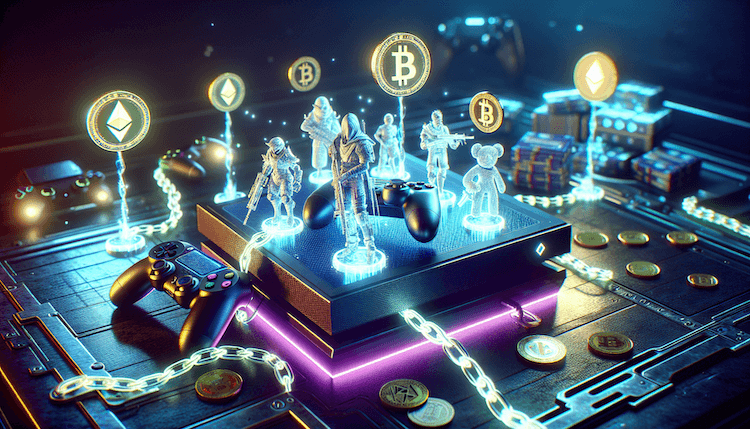
Table of Contents
How is blockchain used in gaming?
Blockchain is used in gaming to enable interoperable player profiles, enhance player security, and incorporate elements like cryptocurrencies and non-fungible tokens for monetization. This allows players to use their unique public addresses across different blockchain networks and trade in-game items for cryptocurrency or NFTs (non-fungible tokens).
Is blockchain the future of gaming?
Yes, the blockchain is expected to play a major role in the future of gaming, with projections indicating significant market growth and major industry players investing in blockchain games.
How big is the blockchain gaming industry?
The blockchain gaming industry is currently valued at around $4.6 billion in 2022, with projections to reach up to $65.7 billion by 2027. This shows a significant growth potential for the industry.
What are Web3 games?
Web3 games, built on blockchain technology, enable players to have actual ownership of in-game assets through non-fungible or fungible tokens. These games represent a major shift in the gaming industry and are hosted on the blockchain, making them secure and equally accessible to all players.
What is blockchain gaming?
Blockchain gaming is a form of gaming that utilizes blockchain technology to offer players genuine ownership of in-game assets, secure transactions, and play-to-earn opportunities.
Key Takeaways
- Blockchain gaming introduces a ‘play-to-earn’ model, offering players true ownership of in-game assets and the potential for real-world financial gains through secure blockchain technology.
- Technical and regulatory challenges such as scalability, high transaction fees, and market adoption represent significant hurdles to the mainstream acceptance of blockchain gaming, but ongoing advancements seek to address these issues.
- Interoperability and the unique features of NFTs within games create a new ecosystem for players, providing opportunities for in-game asset trading, investments and enhancing the gaming experience across various platforms.
How to use Gaming Blockchain: Easy Step by Step Guide
STEP 1: Understand the Basics of Blockchain and Cryptocurrency
– Learn About Blockchain: Understand what blockchain is, how it works, and why it’s revolutionary, especially in terms of decentralization, security, and transparency. You can easily do this via our extensive Blog section.
– Familiarize with Cryptocurrencies: Get to know the basics of cryptocurrencies, which are often used as the medium of exchange within blockchain games.
STEP 2: Set Up a Digital Wallet
– Choose a Digital Wallet: Select a digital wallet that supports the cryptocurrency used by the gaming platform you’re interested in. This wallet will store your digital assets and in-game earnings.
– Secure Your Wallet: Ensure your wallet is secure by using strong passwords and enabling two-factor authentication (2FA).
STEP 3: Research and Select a Blockchain Game
– Find a Game that Interests You: Look for games that match your interests and gaming style. Consider genres, gameplay mechanics, and the potential for earnings.
– Understand the Game’s Economy: Learn how the game’s economy works, including how to earn and spend in-game currency, and how it can be converted into real-world money.
STEP 4: Start Playing and Earning
– Learn the Rules: Spend some time understanding the rules and strategies of the game to maximize your earning potential.
– Earn In-Game Assets: Participate in the game to earn in-game currencies, items, or tokens that have value both within and outside the game environment.
STEP 5: Trade and Invest Your Earnings
– Use Marketplaces: Explore in-game or external marketplaces to trade your in-game assets for other valuable cryptocurrencies or fiat money.
– Be Cautious with Investments: Understand the volatility of cryptocurrencies and the risks involved in digital asset investments.
– Invest Wisely: Consider reinvesting your earnings into other in-game assets or cryptocurrencies, but be aware of the risks involved. You can invest wisely and safely also with us at Orcabay.
STEP 6: Legal and Tax Implications
– Understand Your Obligations: Be aware of the legal and tax implications that exist in your country related to earning money through blockchain gaming and cryptocurrency trading.
Unlocking the World of Blockchain Games
Blockchain gaming represents a paradigm shift in the gaming industry. It’s an evolution from the traditional gaming model dominated by game publishers to a new era of blockchain based games. This innovative blockchain game model empowers players with genuine ownership of their in-game assets and guarantees secure, transparent transactions via blockchain technology.
These play to earn games are moving beyond the traditional “pay-to-win” model to a “play-to-earn” model, where players can earn tokens or other rewards by achieving in-game milestones. This shift is creating a new gaming economy, one that is driven by players and offers a plethora of opportunities for both game developers and players alike.
The Mechanics of Blockchain Gaming
Blockchain gaming mechanics significantly deviate from those of traditional gaming. At the heart of this new gaming model are:
Crypto wallets, which serve as the gateway to the gaming ecosystem, allowing players to manage and access their in-game assets
Smart contracts, which automate in-game actions and transactions, ensuring fairness and transparency
Tokens, which serve various functions, from purchasing in-game assets to incentivizing community engagement.
What’s more, all these transactions are recorded on a transparent, immutable ledger, fostering trust among players and preventing fraud and cheating. It’s like having an incorruptible referee overseeing every move in the game.
In-Game Assets Transformed
In blockchain gaming, in-game assets gain a unique form of autonomy. Through the power of non-fungible tokens (NFTs), gaming assets such as weapons, skins, or power-ups can be tokenized and traded on open marketplaces. This ability to trade in game items beyond the confines of the game itself has given rise to new platforms like OpenSea, Rarible, and SuperRare, where gamers and collectors alike can buy and sell game-based NFTs.
But the magic of NFTs doesn’t stop there. These digital assets can be used across different games or platforms, thanks to interoperability, adding another layer of utility and value to these assets.
Play, Earn, and Thrive
The play-to-earn model is a captivating feature of blockchain gaming. Unlike traditional games where players spend money to gain advantages, blockchain games reward players for their time and effort. Players can earn tokens, NFTs, and other rewards by completing tasks, winning battles, or reaching in-game milestones.
These rewards can then be traded or sold on various marketplaces, potentially leading to real-world financial gains. This unique model of gaming has not only democratized the gaming industry but has also opened up a new avenue for players to earn while they play.
The Advent of Crypto Games
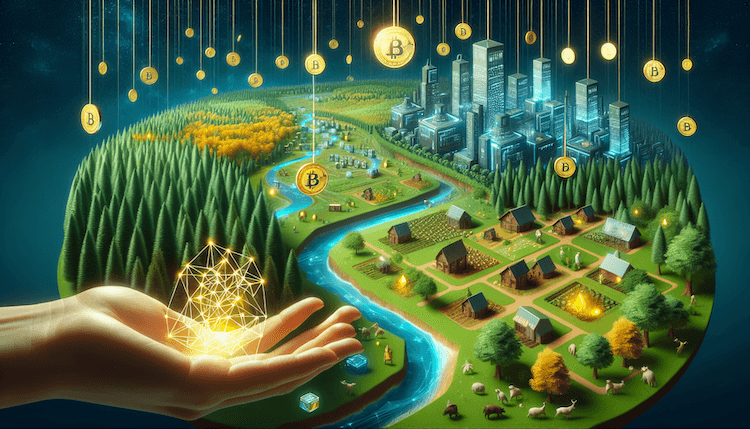
Crypto games have ushered in a fresh epoch in the gaming industry. These games combine traditional gaming elements with blockchain technology, creating a unique blend of entertainment and finance. Crypto games range from simple collectible games to complex quests and adventures, all with the potential for real-world financial gains.
They have also introduced innovative business models that provide unique monetization strategies for game developers. The result is a vibrant and diverse gaming ecosystem that offers something for everyone, from casual gamers to hardcore crypto enthusiasts.
From Collectibles to Quests
Initially, crypto games primarily focused on collecting digital assets. However, these games have progressed in tandem with technological advances. Today’s crypto games are much more diverse and complex. They offer everything from simple collectible-based games to full-fledged quests and adventures.
These games provide players with engaging gameplay and the chance to earn real-world rewards. Games like BitDegree – The Web3 Exam & Missions, for instance, provide players with exciting quests to complete and valuable digital assets to win. The result is a multifaceted gaming experience that is both fun and financially rewarding.
Bridging Virtual and Real Economies
Blockchain gaming’s capacity to merge virtual and real economies is one of its most thrilling aspects. Through blockchain technology, in-game achievements and assets can have real-world financial value. Players can earn cryptocurrencies by completing tasks and quests, and then trade these digital assets for real money on various marketplaces.
This not only adds a whole new dimension to gaming but also opens up new economic opportunities for players around the world.
The Ecosystem of NFT Games

The realm of NFT games is a captivating ecosystem teeming with dynamic digital assets. These games use NFTs to represent in-game assets, adding a layer of uniqueness and value to each asset. The result is a vibrant and dynamic ecosystem where assets have varying degrees of rarity and value, attracting both gamers and investors.
From virtual land in metaverse games to rare collectibles in RPG games, NFTs have transformed the gaming landscape, creating new opportunities for ownership, earning, and collaboration.
The Rarity Factor
Rarity holds significant importance in the domain of NFT games. The rarer an NFT is, the more valuable it is. This is because rarity increases the desirability and potential market value of an NFT. And it’s not just about scarcity. The value of an NFT also depends on its unique traits and attributes.
For instance, in a game like Wolf Game, certain characters might be rarer than others, making them more valuable to players and collectors. This unique dynamic adds a whole new layer of excitement and strategy to gaming, making every game a potential treasure hunt.
Beyond Gaming: NFTs as Investments
Although NFTs have transformed gaming, their impact reaches further into realms beyond the virtual world. NFTs can also serve as investments, with some digital assets appreciating in value over time. For instance, virtual land in a game like Axie Infinity can increase in value as the game becomes more popular. This has led to a booming secondary market for in-game NFTs, where players can buy and sell their digital assets for profit.
But like any investment, NFTs come with their own set of risks, including market volatility and potential fraud, so it’s important to do your research and tread carefully.
Empowering Players through Decentralized Gaming
Decentralized gaming focuses on reinstating power to the players. Unlike traditional games where game developers hold all the control, decentralized games put players at the center of the gaming experience. Players have more control over their game data, digital assets, and the overall gaming experience.
This not only enhances the gaming experience but also creates new opportunities for creativity, collaboration, and economic growth.
Democratic Game Development
Within the blockchain gaming sphere, players influence game development decisions. Through decentralized autonomous organizations, or DAOs, players can vote on game design decisions, contribute to the development process, and even share in the game’s profits. This democratic approach to game development not only empowers players but also fosters a more inclusive and diverse gaming community.
Games like Syndicate and Game Dev Story are examples of democratic game development in action, offering players a high level of control and engagement in the game’s development process by game companies.
The Role of DAOs in Gaming
In the realm of decentralized gaming, DAOs have a significant part to play. They:
Give players a voice in the game development process
Provide a transparent and democratic way for decisions to be made
Oversee the game’s development
Manage in-game assets
Make decisions about the game’s future
This can include everything from deciding on new features to determining how in-game resources are distributed. The result is a game that is truly driven by its community, creating a more engaging and rewarding gaming experience for all.
Challenges and Limitations of Blockchain in Gaming
Despite its immense potential, blockchain gaming encounters its share of challenges. Some of these challenges include:
Scalability issues
High transaction fees
Steep learning curve for new players
Regulatory hurdles
Market adoption challenges
Addressing these challenges is crucial in order to bring blockchain gaming into the mainstream.
Despite these challenges, the future of blockchain gaming looks promising, with innovative solutions and advancements in technology paving the way for more accessible and enjoyable gaming experiences.
Overcoming Technical Barriers
Surmounting technical barriers is essential to promote blockchain gaming on a broader scale. Scalability is a key issue, as blockchain networks need to be able to handle a large number of transactions quickly and efficiently. High transaction fees can also be a barrier, making it expensive for players to carry out in-game activities. However, solutions such as layer two solutions are being developed to address these issues, offering faster transaction times and lower fees.
As these technical challenges are addressed, blockchain gaming will become more accessible and enjoyable for all.
Regulatory Hurdles and Market Adoption
Blockchain gaming also faces the significant obstacle of regulatory issues. Cryptocurrency regulations, intellectual property issues, and data privacy concerns can all pose obstacles for the growth of the industry. In addition, the complexity of blockchain technology can make it difficult for new players to understand and adopt.
However, as lawmakers and regulators become more familiar with blockchain technology, and as more educational resources become available, these hurdles are expected to lessen, paving the way for wider market adoption of blockchain gaming.
Spotlight on Popular Metaverse Games
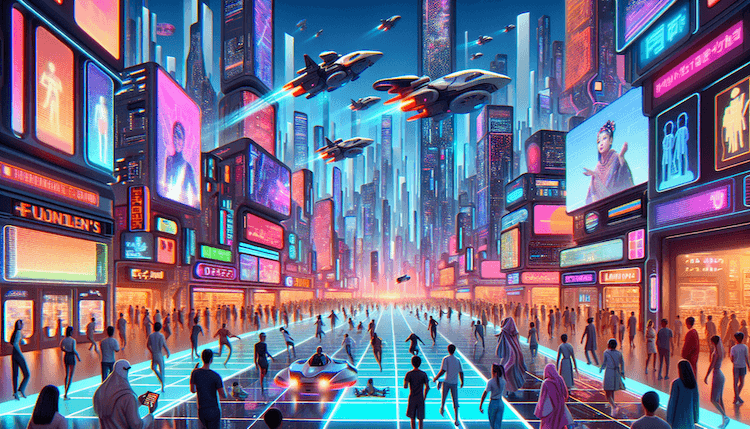
Among the dynamic landscape of blockchain gaming, metaverse games distinguish themselves with their immersive virtual environments. These games offer players a chance to own land, create societies, and interact with other players in a shared virtual space.
Games like Axie Infinity, Decentraland, and Sandbox have gained immense popularity, offering players an engaging gaming experience coupled with the potential for real-world financial gains.
Virtual Land and Digital Societies
Many metaverse games are centered around the concepts of virtual land and digital societies. Players can:
Own and develop virtual land
Create their own unique spaces within the game
Use their land as a status symbol, a creative hub, or a meeting place for players from around the world.
Digital societies offer a social dimension to playing games, allowing players to interact, collaborate, and even form communities within the realm of video games. The possibilities are endless, making each gaming experience truly unique.
Interoperability Across Games
Another salient feature of blockchain gaming is interoperability. It allows players to use their digital assets and identities across different games, enhancing the gaming experience. For instance, an NFT acquired in one game can potentially be used in another game, adding a layer of utility and value to these digital assets.
While there are technical challenges to achieving full interoperability, advancements in blockchain technology are paving the way for more interconnected gaming experiences.
The Future Landscape of Blockchain Gaming
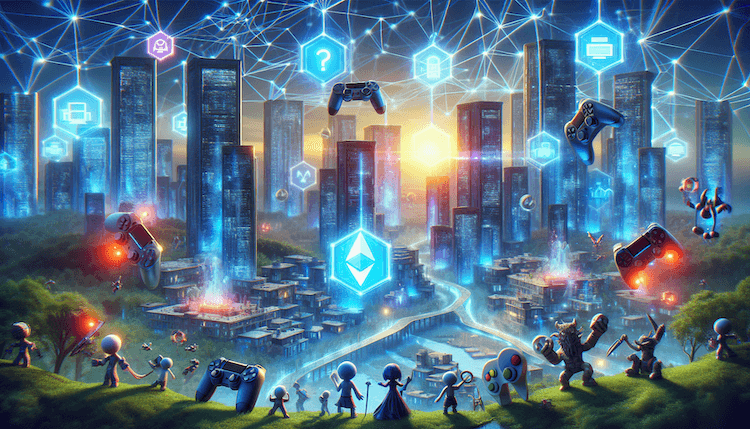
Looking ahead, blockchain gaming is poised to bring a revolutionary change to the gaming industry. The evolution of gaming models, driven by blockchain technology, will offer players more opportunities for ownership, earning, and collaboration. Overcoming technical and regulatory challenges will be key to achieving mainstream acceptance and growth.
As these challenges are addressed, and as more players discover the unique advantages of blockchain gaming, the industry is set to experience unprecedented growth.
Evolution of Gaming Models
Blockchain gaming is transforming not just our gaming experiences but also the methodologies of game development. With the advent of play-to-earn models, players are no longer just consumers but also contributors to the gaming economy. Blockchain game developers are creating a more engaging and rewarding gaming experience by allowing players to earn real-world rewards for their in-game achievements.
As blockchain gaming continues to evolve, we can expect to see new and innovative gaming models emerge, offering even more opportunities for players.
Mainstream Acceptance and Growth
The future success of blockchain gaming will heavily rely on its acceptance and expansion in the mainstream market. As more players understand the benefits of blockchain gaming and as the technology becomes more accessible, the industry is set to experience significant growth. Already, games like Axie Infinity and The Sandbox have gained widespread acceptance, demonstrating the potential of blockchain gaming.
Overcoming regulatory hurdles and educating players about the benefits and risks of blockchain gaming will be crucial in driving further adoption.
Summary
In conclusion, blockchain gaming is a revolutionary development in the gaming industry, offering unprecedented opportunities for player ownership, earning, and collaboration. From transforming in-game assets to empowering players through decentralized gaming, blockchain is reshaping the gaming landscape. While there are technical and regulatory challenges to overcome, the future of blockchain gaming looks promising, with the potential for significant growth and mainstream acceptance. In this exciting new world of gaming, the power lies in the hands of the players.
Disclaimer: The information provided in this article is for informational purposes only and does not constitute financial, investment, or other professional advice. All opinions expressed herein are solely those of the author and do not represent the views or opinions of any entity with which the author may be associated. Investing in financial markets involves risk, including the potential loss of principal. Readers should perform their own research and consult with a licensed financial advisor before making any investment decisions. Past performance is not indicative of future results.

Jakob Brezigar
Jakob, an experienced specialist in the field of cryptocurrency market making, boasts an extensive international presence. With Orcabay, he has skillfully managed major operations and deals for a wide array of global stakeholders.


